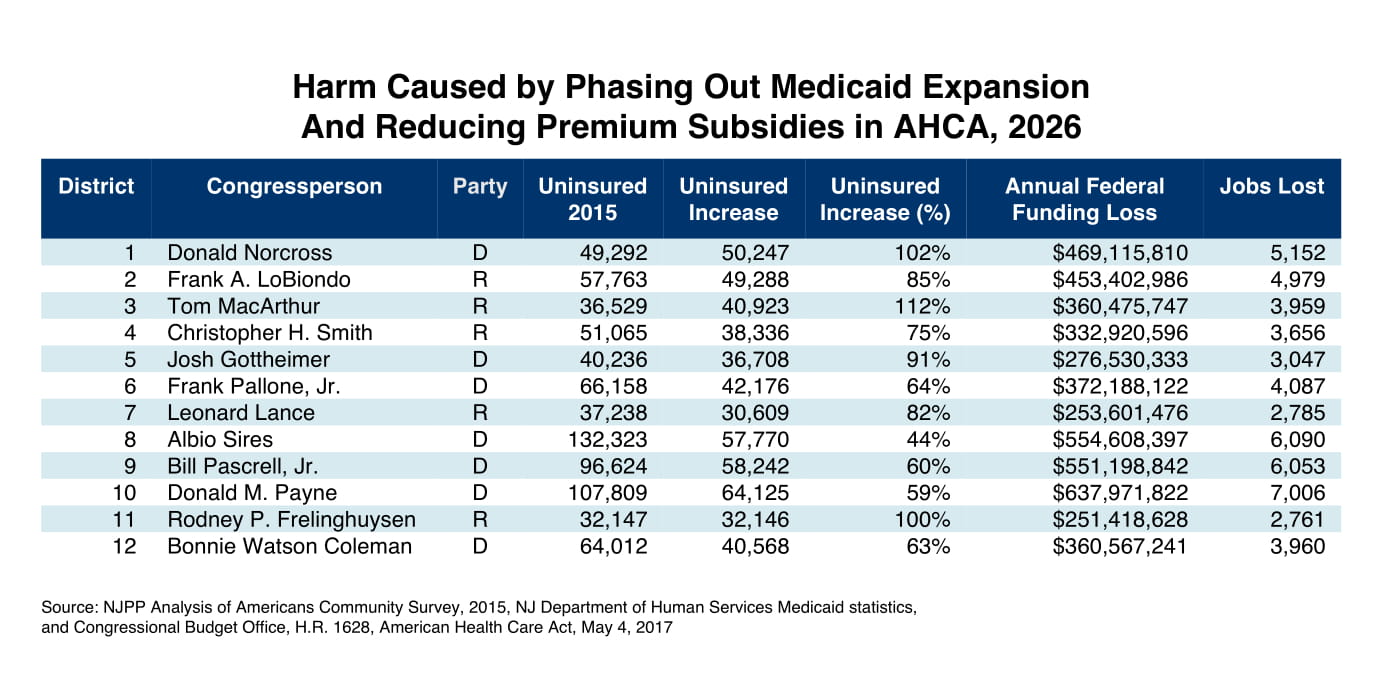To read a PDF version of this report, click here.
May 4th marks a day of infamy in New Jersey and nationally, for it was on that day that Congress passed the American Health Care Act of 2017 in an attempt to “repeal and replace” the Affordable Care Act.
The stakes were particularly high for New Jersey because about 800,000 New Jerseyans – nearly 10 percent of the state’s population – obtained their health coverage through the ACA, either in the private individual marketplace or though the Medicaid expansion. Enactment of this bill would have caused irreparable harm to the state’s health, budget and economy.
To the credit of the New Jersey Congressional Delegation, 10 of the 12 members voted against it, including three of the five Republican members. While that was not enough to prevent passage in the House, the bill fortunately failed in the Senate. Here is what would have happened in New Jersey if this regressive bill had become law:1
Over Half a Million New Jerseyans Would Have Lost Health Coverage
- 540,000 New Jersey residents would have become uninsured.
- The uninsurance rate would have spiked by 50 percent (from 9.8% in 2016 to 14.7% by 2026).
- The newly uninsured would have consisted of an equal number of New Jerseyans who had insurance in Medicaid or the Marketplace.
The Uninsured Would Have Spiked in All Congressional Districts
- Tens of thousands of residents would have lost health coverage in all Congressional districts (see table).
- Districts represented by Republicans would have seen a larger average percentage increase in the number of uninsured than districts represented by Democrats.
One in 10 New Jersey Adults Would Have Lost Coverage Due to the Effective End of the Medicaid Expansion
- Enrollment would have likely fallen from 562,000 adults to 6,000 by 2027.
- Eliminating the federal matching rate of 90 percent would have meant that New Jersey could not afford to maintain the Medicaid expansion.
- New Jersey would have lost about $21 billion in federal funds for the Medicaid expansion over 7 years.
- State costs for charity care would have increased by the hundreds of millions.
A Permanent Cap on Federal Medicaid Funds Would Have Threatened the Health of 1.6 Million Vulnerable New Jerseyans
- The cap would have harmed everyone on Medicaid but especially seniors and people with disabilities because they represent about three quarters of Medicaid funding.
- The already very low reimbursement rates to providers would have been reduced even lower which would have sharply limited access to critical medical care.
Premiums for New Jerseyans With Preexisting Conditions Could Have BecomeUnaffordable
- Premium tax credits would be reduced by $7 billion in New Jersey over 10 years.
- Instead of a share of a person’s income, premium credits would have been based on age.
- Older New Jerseyans would have been hit with up to an 800% increase in the cost for their insurance, making it unaffordable for most of them.
- Due to New Jersey’s own Congressman Tom MacArthur’s amendment, states would have been allowed to greatly increase premiums based on pre-existing conditions and eliminate essential benefits like hospitalization, maternity care and mental health or substance abuse treatment.
New Jersey’s Economy Would Have Been Disrupted and Thousands of Jobs Lost
- New Jersey would have lost about $4.8 billion annually in federal funds which would have led to a $6.6 billion loss in economic activity and 54,000 jobs.
Endnotes
[1] For sources to all data, see Raymond Castro, House-Passed Health Bill Would End Coverage for More Than Half a Million New Jerseyans, New Jersey Policy Perspective, June 2017, https://www.njpp.org/healthcare/house-passed-health-bill-would-end-coverage-for-more-than-half-a-million-new-jerseyans


